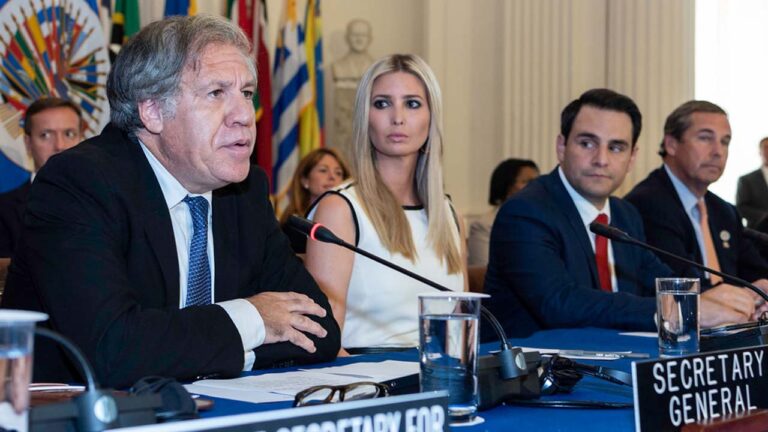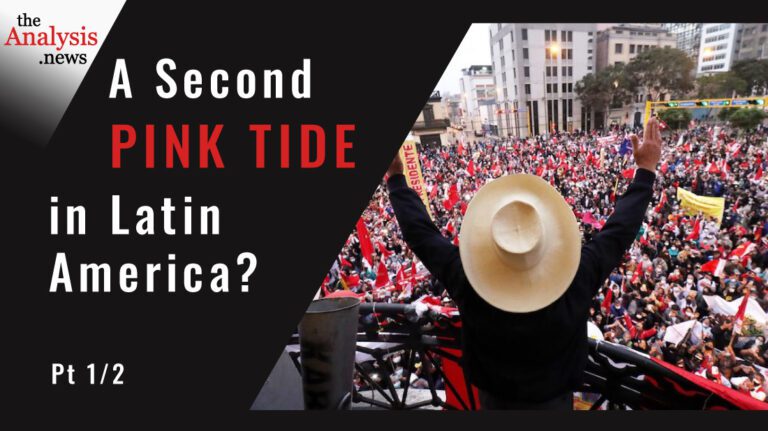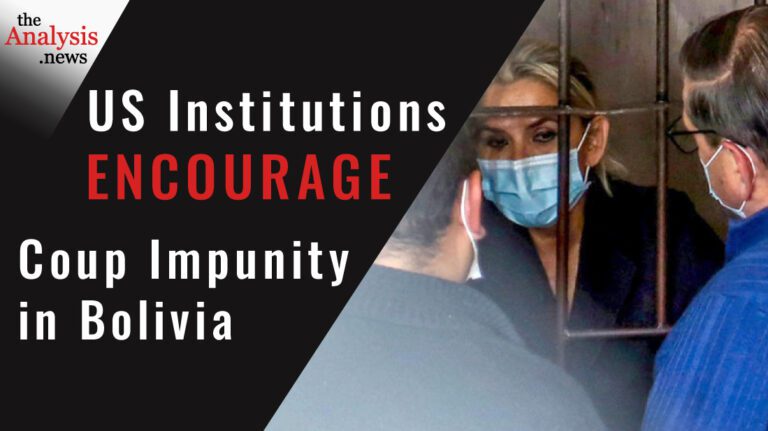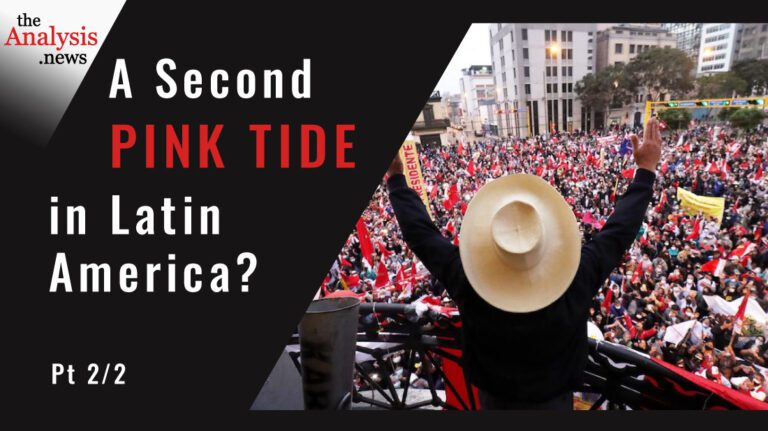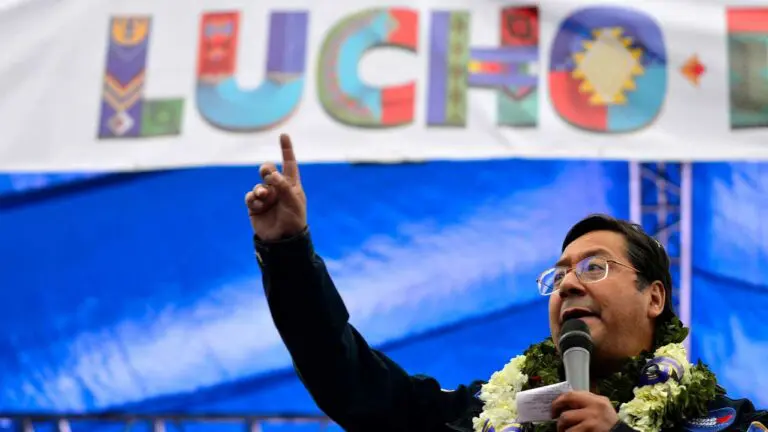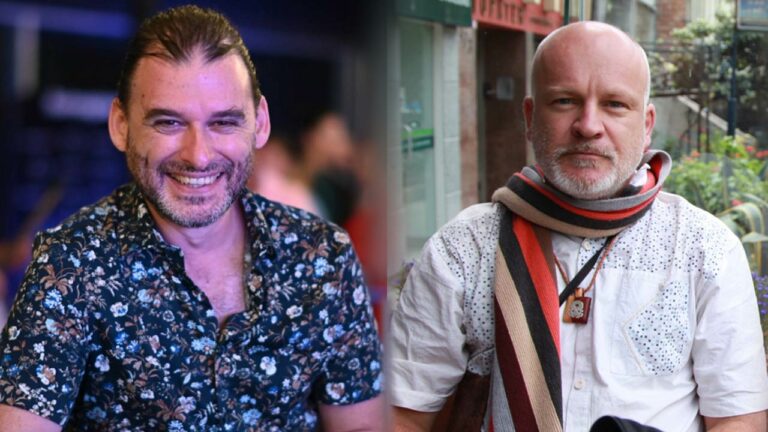Kathryn Ledebur, of the Andean Information Network in Cochabamba, talks about what the election result means for Bolivia and how it has dealt a serious blow to the country’s fascistic far-right.
Transcript
Greg Wilpert
Hi, I’m Greg Wilpert, guest host for theAnalysis.news podcast. Last Sunday, Bolivians returned to voting
centers to cast ballots for president and for the legislature, and exit polls suggest that the movement
toward socialism, the former governing party under Evo Morales, won this election resoundingly with
just over 50% of the result. The election took place almost exactly a year after the October 20th, 2019
election, which had ended in controversy because the opposition and the Organization of American
States claimed that widespread fraud had taken place. Eventually, on November 10th of last year,
following anti-government protests and rebellions among the police, and an ultimatum from the
Bolivian military, President Evo Morales was forced to resign.
Morales fled into exile, first to Mexico, and then Argentina. Meanwhile, a far-right government took
over under interim president Jeanine Áñez, who became president under highly questionable
circumstances. Waves of violence, including two massacres against supporters of Evo Morales, took
place in the following months. Joining me now to discuss the outcome of Sunday’s election in Bolivia is
Katheryn Ledebur. She is director of the Andean Information Network, and a researcher, activist, and
analyst with over two decades of experience in Bolivia, who joins me from Cochabamba, Bolivia.
Thanks for being on the program again, Katheryn.
Katheryn Ledebur
Thanks so much for having me, Greg.
Greg Wilpert
So let’s start with what we know about the results of the Sunday election, that is, what do we know in
terms of what the outcome was, and when can we expect official results?
Katheryn Ledebur
Well, as usual, as is typical in Bolivian elections, the official results take two or three days.
What we know from the exit polls, and they were exit polls that were delayed until past midnight last
night, is that it seems clear that MAS (Movement for Socialism Party) has won the presidency in the first
round.
The opposition candidate, the interim government, and even the US State Department has accepted
that Luis Arce is president-elect, and so although we wait for official confirmation, it’s quite clear that
MAS has won, that they’ve won by a sufficient margin to take the presidency, that they should be
inaugurated in the next several weeks.
It remains to be seen whether the Bolivian armed forces and the irregular para-state groups will accept
this decision. The Organization of American States Inter-American Human Rights Commission was
supposed to begin its work on the investigation of the gross human rights violations that occurred
during the coup and the Áñez government, but Áñez officials continue to pressure to impede those
transparent investigations. So we have an electoral win, we have a clear leader, we have an electoral
process, and delays in the process that cast significant doubt upon the OAS allegations of fraud in the
previous election.
And so I think it calls for a moment of reflection about Bolivian democracy, about what has happened
and the atrocities of the past year, and what is the best way to move forward to respect the rights of all
Bolivians, and to move out of this morass of repression, racism, and polarization that Bolivia has found
itself in for the past year.
Greg Wilpert
I think that’s a very good point. I mean, sometimes, not always, but sometimes when there is a
controversial election, there’s some effort to try to make the following election a little bit more
transparent, a little bit cleaner, and to basically improve the process. Did that happen for this election,
or is that something that still needs to be done?
Katheryn Ledebur
Well, it’s interesting because the allegations of fraud in the previous election were based largely on a
delay in the preliminary results through a computer program, a freezing of the results, and an alleged
discrepancy in the vote count.
I mean, I think that it’s pretty ironic that the night before the election, Saturday night, the new Bolivian
electoral court said it had decided to do away with their new preliminary results program because they
thought that it was problematic, and that that was not a necessity, and that they were going to focus on
the initial count. That pretty much blows out of the water the whole reasoning for fraud accusations in
the previous election.
But looking forward, what we have are clear results and a clear mandate for MAS. I think that it’s really
important to note that during the coup, and with the political persecution that we saw, people were
very afraid.
And the Bolivian press did not cover human rights violations and repression. The community radios and
the left-leaning press outlets were silenced, and threatened, and abused.
And so there was a lack of information about what was going on, and a movement of paid accounts in
social media that suggested widespread support for Áñez, widespread support from the right. Polls
didn’t reflect the strong level of support for MAS, and I think it’s common sense. I think there’s always
been strong support for MAS, and there was a portion of the Bolivian electorate that had become
disenchanted, or weren’t in agreement with a fourth term for Morales. But the situation now is very,
very different. I think that all Bolivians had a taste of how bad things could actually be, and undoubtedly
there were mistakes in the Morales administration and things they could have done better, but I think
nothing compares to the repression, and the violence, and the corruption, and the racism, and the hate
that this interim government stoked, basically with the support of the Trump administration, with the
support of other opposition candidates, with the support of Carlos Mesa, who had presented himself as
a moderate candidate, but who didn’t denounce the violence, and consistently sided with the far right
on most issues.
Greg Wilpert
Hmm. I mean, one thing, of course, that is interesting, and you briefly touched on that is, of course, the
role of the OAS. I don’t want to suggest that we get into that right now because we have discussed that
in previous interviews, actually the previous one that we did a couple of weeks ago.
But I think that’s something, of course, important to keep in mind, is the extent to which of the OAS
played an important role in distorting the actual result by making a declaration that was not based on
any kind of solid foundation in terms of suggesting that there was fraud that took place. And I’m just
wondering, has there been any kind of reflection since then about the role of the OAS in this election?
Katheryn Ledebur
Well, I think that there’s been a lot of reflection, but right now, Bolivians and the left are really focused
on the vote count, and making sure that this time it’s reported accurately, and that there is a peaceful
transition to democracy, and that justice is done, because I think that it’s clear that what happened last
year was a coup, and that it was based on a false premise, and that this year things need to be different,
and how we move forward.
I think that MAS has expressed a very measured view of focusing on progress and not revenge, but
justice is the foundation for all of this, and that means accountability for human rights violations, and
that means assistance for the affected families, and that means the liberation of the political prisoners,
and an end to the political persecution. And I think without that, we can’t move forward, and without
recognition on the part of the international community that that has occurred, and that these errors
have to be corrected, we’re not going to make any progress.
Greg Wilpert
Now turning to, I mean, you already started talking about this now but, what can we expect from Luis
Arce as the president and the leader of the movement toward socialism, the MAS?
Katheryn Ledebur
I think that we can expect from Luis Arce, and
David Choquehuanca because I think it’s very much a team, it’s not a first and second place, is a
rethinking of Bolivian government, a focus on new leadership, a focus on rebuilding the economy, and
on health care, and social justice issues, and a systematic approach to rebuilding state institutions which
were dismantled. They need to look carefully at justice, the rule of law is crucial.
Greg Wilpert
And economically, I mean, Luis Arce, as I mentioned earlier, was the finance minister under Evo Morales.
Is this going to be a continuation in that sense of the Morales presidency, economically speaking? Do
you think?
Katheryn Ledebur
Well, yes, because I think that, you know, Arce was the architect of the Bolivian microeconomic vision,
and we’re starting now in a hole, because it’s incredible after 14 years of sustained growth and a
prudent fiscal policy that the Áñez administration was able to throw Bolivia in a hole of debt almost
immediately. It’s not clear when the government takes over if there’s any money left in the coffers.
They’ve taken out many loans from the IMF that are going to have to be addressed. They may have
dipped into pension funds. They’ve sacked the state companies and industries.
And we have no idea what happened to the hundreds of millions of dollars of COVID aid that the Áñez
government received, but I can guarantee you it didn’t go to COVID relief, and it wasn’t distributed to
rural governments, and it wasn’t distributed to social organizations, and so where that money is, it’s
anybody’s guess.
So it’s really going to be a slow process of rebuilding. But MAS has a plan and a vision, and certainly Arce
does, and I think that they have the best bet of how to rebuild Bolivia’s economy, because right now it’s
in tatters, and it only took a year to do it.
Greg Wilpert
Speaking of COVID, I mean, one of the things that seems to stand out is that Bolivia has one of the
highest death rates in Latin America with respect to COVID infections. And so, is there any indication as
to how an Arce-Choquehuanca government will try to deal with a pandemic?
Katheryn Ledebur
Well, they’ve talked about a focus on health care. I think that they’re much better at economic
management. I think that they’re going to have to get in there to see.
But the important thing to note about the previous MAS government and MAS supporters is that they
have some really skilled people. They have public health experts. They have people who have concrete
experience in the health issue. I think we can look at renewed assistance from Cuba, and Cuba has done
an excellent job in dealing with the pandemic. So, you know, a lot of details are not clear, and the
political persecution has been so acute that there hasn’t been a possibility for MAS to admit a plan. But
what we do know is that there’s a much stronger commitment to the grassroots, there’s a much
stronger level of consultation with social movements and rural areas where they can more aptly identify
the needs, and assure that the necessary assistance makes it to them. And that’s just crucial.
That actually brings me to my next question, which is that historically, it seems that one of the reasons
that the government under Evo Morales was relatively successful is precisely kind of the confluence, or
working together of the government and the social movements. Of course, there are divisions and there
are different currents and so on. What does it look like now in terms of social movements in Bolivia? Are
they firmly behind the Arce government or is there kind of a questioning? Are they pushing the
government a particular way? What’s your analysis?
Katheryn Ledebur
Well, yes, they are, they’re firmly behind the Arce government, even Felipe Quispe Huanca, “el Mallku,”
(a historian and political leader in Bolivia) has backed the Arce government. But that doesn’t mean it’s a
blank check. I really have a strong rejection of the mainstream English language press that presents
these social movements as zombies, blindly following non-thinking beings. No, each group has its own
interests and its concerns. Each group will expect to be heard. They’ll expect an inclusive government,
and it will be a process for the Arce government to negotiate and to consult. This image of Evo Morales
making every decision unilaterally is really not a reflection about how MAS worked ever. The strongest
voice was Morales, but there were really many voices, and many interests, and it’s a constant process of
consensus and negotiation, and that’s something that Arce and Choquehuanca will have to do. And they
know that, and they’re ready to do that, but it’s not an easy thing, nor should it be.
Greg Wilpert
And what about the right, the far-right? I’m particularly thinking about Jeanine Áñez, who withdrew
shortly before the election from running, even though she had originally said that she was going to run,
but then she realized that she was dividing the far-right vote. And then, of course, there’s Luis Fernando
Camacho, who represents the other faction of the far-right, who only, looks like according to the exit
polls, didn’t get very much of a vote, but still seems to represent a particularly vocal, and perhaps at
least economically strong faction in Bolivian life.
What do you think they’re going to do? What’s been their reaction so far to Arce’s election?
Katheryn Ledebur
Well, you know, Áñez has accepted it verbally. I don’t think she’s pleased with it. Certainly her
withdrawal from the race was something that was calculated and negotiated for a Mesa win, and
negotiated, I’m sure, with conditions of impunity and, you know, a return to brokered democracy,
where her party and her cronies got a chunk. I don’t think she’s that different from Camacho, really. So
far, Camacho hasn’t said anything, and then we’ve just seen him cry on TV.
But, although Áñez will probably end up in Boca Raton or Rio de Janeiro with her other cabinet
members, I think the far-right are not going away. The far-right has never played a fair fight, they’ve
never actually engaged in a campaign in a meaningful way, or engaged with a great bulk of the Bolivian
population. And I think the kind of hijinx and undermining behavior that we saw throughout the
administration of Evo Morales, but that met this crescendo with this Trump-like far-right, really fascist
focus is going to go now behind the scenes. I think that they’ve been discredited, and that they did
worse than anybody expected them to. But that doesn’t mean that these high-level economic interests
are going away.
And I think that both Áñez and Camacho are the figureheads, or the dummies for the more powerful
ventriloquists and economic elites that are pulling the strings from behind. And so they may go away,
and their faces may change, but I don’t think those interests and that ill intent is going anywhere any
time soon. There’s a rumor that Camacho may run for governor of Santa Cruz in the upcoming
departmental and municipal elections.
He still has a great deal of support in urban Santa Cruz, and I assume that they will keep trying to
exacerbate those class and regional cleavages to the greatest extent possible.
Greg Wilpert
Now, you mentioned the elite economic interests, and actually Evo Morales in the aftermath of the coup
against him last year, actually, at one point, I believe, called the coup a lithium coup, alluding basically to
the strong transnational economic interests behind exploiting Bolivia’s lithium deposits, which are
absolutely essential actually for the growing market in batteries. And so I’m just wondering if the new
government, the Arce government, has said anything about what it plans to do about these kinds of,
well, basically the policy of “extractivism” as many have called it. Bolivia is also a big producer of natural
gas.
I mean, is there going to be any kind of shift in policy towards “extractivism,” which has been criticized
also by some people on the left, or how do you see that developing?
Katheryn Ledebur
Well, I think that the idea that it was a lithium coup is kind of a metaphor for Bolivia’s national resources
and natural resources, and it’s much more complex than just lithium. But I think that those interests
were there, and I think the interest to sell off these state companies, you know, amongst cronies, and
for personal gain, was a very key part of this coup, although a lot of it was also revenge, and
punishment, and political power.
The Morales administration had a very solid plan for lithium, where the power and the wealth remained
in Bolivian hands, but the technical capacity was part of a consortium with German companies that was
going to allow them to produce batteries within Bolivia, and for Bolivia to have that added value.
It’s my assumption, although I can’t promise you that, that those agreements will be reinitiated.
Formally, the Arce team has spoken of looking at ways to move beyond extractive industries, and to look
for alternatives, and to make things more sustainable and environmentally sound in the long term. In
the short term, with the economic crisis facing Bolivia, due to mismanagement and the pandemic, I think
it’s going to be harder to break away from extractive industries in the very short term, but that there is a
recognition of the problematic nature of a focus on extractive industries and hydrocarbons, and the
need to expand.
We will see how that goes and we’ll hope for the best.
Greg Wilpert
OK, well, on that note, I think we’re going to leave it there for now. I was speaking to Katheryn Ledebur,
director of the Andean Information Network based in Cochabamba, Bolivia. Thanks again, Katheryn, for
having joined me today.
Katheryn Ledebur
Thanks so much for having me, Greg.
Greg Wilpert
And I’m Greg Wilpert, guest host for theAnalysis.news podcast. Please visit our website where you can
donate to keep this podcast and the website going. Thank you.

